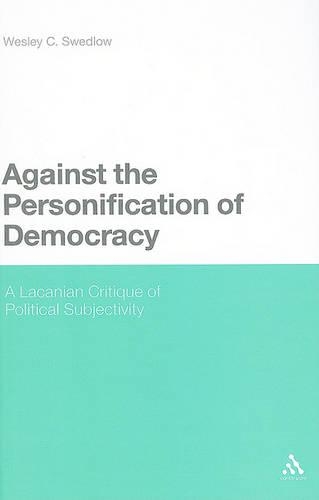
Against the Personification of Democracy: A Lacanian Critique of Political Subjectivity
(Hardback)
Available Formats
Publishing Details
Against the Personification of Democracy: A Lacanian Critique of Political Subjectivity
By (Author) Wesley C. Swedlow
Bloomsbury Publishing PLC
Continuum International Publishing Group Ltd.
1st January 2010
United Kingdom
Classifications
Tertiary Education
Non Fiction
Social and political philosophy
Political ideologies and movements
320.01
Physical Properties
Hardback
206
Description
Against the Personification of Democracy offers a new theory of political subjectivity that puts the dilemma of desire into the forefront. By using Lacan to read key figures in political philosophy, the book demonstrates why democratic theory -- representative or radical - is not only ineffective when it comes to the best form of political cohabitation, but also productive of destructive and self-defeating forces. The book begins with the debate between Hobbesian and Lockeian notions of subjectivity to argue that the nature of political subjectivity is a function of the problem of desire. It then considers the question of the proper structure of political cohabitation in light of Hannah Arendt's insights into what happened to the stateless in World War II, leading to a distinction between the person in a bare and unadorned form and the public persona that is represented in most forms of democracy. Lacan is used to reread the question of political subjectivity, but, unlike radical democratic theory, the book argues against agonistic, representative, and thus endless democracy. Such a political formation is seen as an instigation and ultimate disappointment to desire (the persona), which leads to general negative outcomes, including genocide, concentration camps, and the removal of rights. Arguing against Zizek's proposal that a radical Act can save us politically, the book proposes a universal political formation as the only way out of the dilemma of political desire. This formation is not dependent on public personas, but rooted in actual persons meeting in their locality and sovereign to no one. An indispensable text for anyone interested in political theory, political philosophy, and democratic theory, Against the Personification of Democracy critiques positive theories of sovereignty through its analysis of political subjectivity and the problem of desire. More importantly, it provides a truly universal theory of democratic cohabitation that escapes political desire and thus the scapegoats of democratic failure, not to mention the anxiety of the impossibility of the democratic promise.
Author Bio
Wesley C. Swedlow has taught courses in philosophy and multiculturalism at DePaul University and is currently affiliated with the University of San Francisco, where he teaches courses in ethics.
